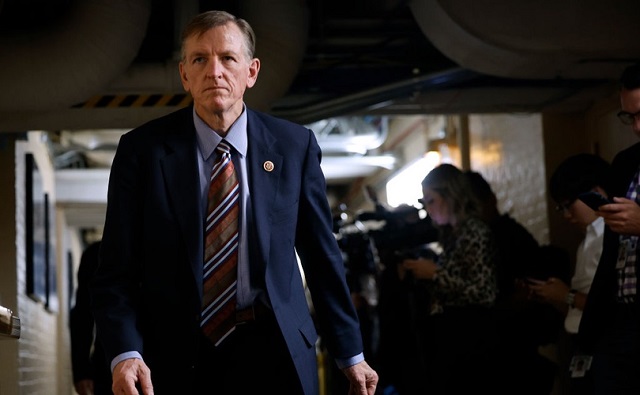International
Rep. Paul Gosar grills Biden official on government funding of underage ‘gender transitions’

U.S. Rep. Paul Gosar of Arizona.
From LifeSiteNews
“I thought the USA was better than that. I thought we were the leaders in science, not followers. I find it disgusting that you still sit there and hide behind that”
The federal government is funding underage “gender reassignment” procedures for the families of government employees and has no interest in keeping track of how many, according to a recent exchange between U.S. Rep. Paul Gosar (R-AZ) and Rob Shriver, acting director of the U.S. Office of Personnel Management (OPM).
During a hearing Tuesday of the House Oversight & Accountability Committee, Gosar pressed Shriver on the Federal Employees Health Benefits Program (FEHB) contracting with health plans that commit surgical and chemical “transition” procedures on children suffering from gender confusion – particularly at a time when the United Kingdom and other European governments are moving away from the practices in response to mounting evidence of their medical dangers that U.S. authorities continue to ignore.
Shriver responded that “the health plans that participate in the FEHB decide on the benefit packages that they make available,” claiming that his office had no authority over the specific benefits of FEHB plans. Gosar was incredulous that he was essentially “allowing a bad product to go forward here,” then noted that FEHB actually mandated coverage of “gender transitions” or “sex transformation” in a 2016 program carrier letter.
Citing restrictions on puberty blockers adopted in recent years by Denmark, England, Finland, Norway, and Sweden, the congressman lamented, “I thought the USA was better than that. I thought we were the leaders in science, not followers. I find it disgusting that you still sit there and hide behind that, when children are being mutilated.”
Shriver also deflected Gosar’s call for “greater transparency” and data collection on children being “transitioned” through FEHB health plans, noting that former OPM director Kiran Ahuja, who stepped down earlier this month for reported health and family issues, previously refused to mandate reporting on how many children receive the “services.”
Gosar previously introduced language to deny taxpayer funding to any FEHB plan that covered “gender transitions” in the most recent government appropriations package, but it was cut from the final version that was signed into law in March.
Contrary to the Biden administration’s pretense of acting in children’s best interests, a significant body of evidence shows that “affirming” gender confusion carries serious harms, especially when done with impressionable children who lack the mental development, emotional maturity, and life experience to consider the long-term ramifications of the decisions being pushed on them, or full knowledge about the long-term effects of life-altering, physically transformative, and often irreversible surgical and chemical procedures.
Studies find that more than 80% of children experiencing gender dysphoria outgrow it on their own by late adolescence, and that full “reassignment” surgery fails to resolve gender-confused individuals’ heightened tendency to engage in self-harm and suicide — and may even exacerbate it, including by reinforcing their confusion and neglecting the actual root causes of their mental strife.
The Biden administration’s own Substance Abuse & Mental Health Services Administration (SAMHSA) released a since-deleted report last year acknowledging that self-professed homosexual and bisexual adults “are more likely than straight adults to use substances, experience mental health conditions including major depressive episodes, and experience serious thoughts of suicide.”
Yet the White House continues to give uncompromising support to all major aspects of the LGBT agenda, including reopening the military to recruits afflicted with gender dysphoria, promoting gender ideology within the military (including “diversity” and drag events on military bases), holding White House events to “affirm transgender kids,” condemning state laws against underage “transitions” as “close to sinful,” promoting underage “transitions” (potentially at taxpayer expense) as a “best practice,” and trying to force federally funded schools to let males into female athletic competitions and restrooms.
International
Sagrada Familia Basilica in Barcelona is now tallest church in the world

The Sagrada Familia (Holy Family) minor basilica in Barcelona is now the tallest church in the world, standing at 535 ft., surpassing Ulm Germany’s main church, whose construction began in the 14th century.
According to the Sagrada Familia Expiatory Church Construction Board Foundation, as reported Oct. 30 by the Archdiocese of Barcelona, ”the first element that forms part of the cross on the tower of Jesus Christ” was installed, marking the beginning of the final phase of construction of the church’s central tower.
Working at a height of more than 150 metres, the crane operators also make it possible for the Sagrada Família to keep growing and rising up towards the Barcelona sky. 🏗 This video takes a behind-the-scenes look at a day in the life of the Basilica’s crane operators. Don’t miss… pic.twitter.com/8ead28LCEG
— La Sagrada Família (@sagradafamilia) October 31, 2025
This latest addition consists of the lower portion of the cross, measuring over 20 ft. high and weighing 24 tons. “With a double-twist geometry, the lower portion has a square shape at the base that transforms into an octagonal shape at the top,” whose exterior is “clad with white glazed ceramic and glass, materials that stand out for their reflective properties and resistance to atmospheric conditions,” the news brief explains.
The tower of Jesus Christ is the tallest of the central towers of the church designed by Antoni Gaudí, who died a century ago. The completion of this structure “will be a historic milestone for Sagrada Familia and a tribute to its architect.”
More than 140 years of history
The first stone of Sagrada Familia Basilica was laid on March 19, 1882, according to the design of the architect Francisco de Paula del Villar. The following year, Antoni Gaudí took over the project, modifying it according to his architectural genius and renowned Modernist style. From 1914, Gaudí dedicated himself exclusively to this church until his death on June 10, 1926.
On April 14, 2025, Pope Francis declared the architect venerable, in accordance with the criteria set by the Dicastery for the Causes of Saints.
This story was first published by ACI Prensa, CNA’s Spanish-language news partner. It has been translated and adapted by CNA.
International
US Reportedly Weighing Military Strikes On Narco Targets Inside Venezuela


From the Daily Caller News Foundation
The U.S. is mulling military strikes on cartel-associated targets in Venezuela, multiple sources told the Wall Street Journal Thursday.
The possible strikes would reportedly include among the targets Venezuelan military airports and seaports involved in the illicit drug trade. They would serve an additional purpose of warning dictator Nicolás Maduro he should step down from power, sources with knowledge of the matter told the WSJ.
The strikes could reportedly happen in a matter of days or hours, sources with knowledge of the situation told the Miami Herald Friday. President Donald Trump has stepped up his pressure campaign against the South American leader, taking a more forceful military posture than during his first term.
Dear Readers:
As a nonprofit, we are dependent on the generosity of our readers.
Please consider making a small donation of any amount here.
Thank you!
Most recently, the USS Gerald Ford carrier strike group was deployed to the Caribbean Sea October 24, adding to an already impressive U.S. presence off the Venezuelan coast in international waters. The Trump administration deployed naval assets to the southern Caribbean in August following their designation of Latin American cartels as Foreign Terrorist Organizations (FTOs).
The White House told the Daily Caller News Foundation that the anonymous sources reporting the story “don’t know what they’re talking about,” and that “any announcements regarding Venezuela policy would come directly from the President.”
-

 Alberta2 days ago
Alberta2 days agoFrom Underdog to Top Broodmare
-

 Business2 days ago
Business2 days agoCanada’s economic performance cratered after Ottawa pivoted to the ‘green’ economy
-

 Business1 day ago
Business1 day agoBank of Canada governor warns citizens to anticipate lower standard of living
-

 Business2 days ago
Business2 days agoCanadians paid $90 billion in government debt interest in 2024/25
-

 International2 days ago
International2 days agoNetanyahu orders deadly strikes on Gaza with over 100 dead despite ceasefire deal
-

 International17 hours ago
International17 hours agoSagrada Familia Basilica in Barcelona is now tallest church in the world
-

 Fraser Institute17 hours ago
Fraser Institute17 hours agoOttawa continues to infringe in areas of provincial jurisdiction
-

 Agriculture16 hours ago
Agriculture16 hours agoCloned foods are coming to a grocer near you




